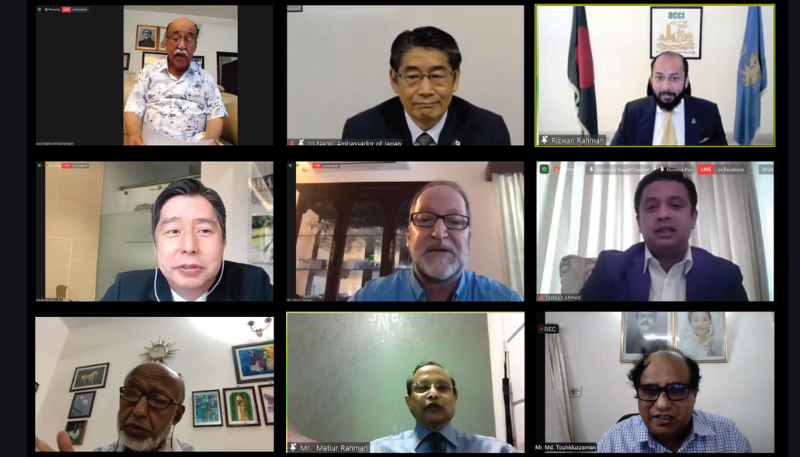Home ›› 18 Apr 2021 ›› World Biz

Speakers at a webinar on Sunday demanded a sustainable tariff policy for 5-10 years coupled with favourable policy support, cash incentive and tax benefits in a bid to flourish local automobile industry, which was expanding by 15 per cent to 20 per cent every year.
Speakers also demanded creating a separate automobile zone and allowing joint ventures for spare parts manufacturing.
They made the call during a webinar titled “Automobile Industry Development: Present Situation and Future Prospects.” Industries minister Nurul Majid Mahmud Humayun joined the webinar as the chief guest while the ambassador of Japan to Bangladesh Ito Naoki participated as a special guest.
Addressing the virtual meeting, Rizwan Rahman, President of Dhaka Chamber of Commerce and Industry, which organised the webinar, said that foreign investors were showing interest in the automobile industry in Bangladesh, currently dominated by imported reconditioned and new vehicles from Japan, China, India, Europe and the USA.
“Despite having potentials, the absence of long-term policy support, consistent tax structure, lack of raw materials from domestic source and relevant skilled manpower and as well as inadequate backward linkage hindered the flourishment of the automobile industry in the country,” he said.
Outlining the prospect of the automobile industry in Bangladesh, the DCCI chief said that before hitting the COVID-19, the automobile market was growing 15 per cent to 20 per cent and with 12 per cent growth in auto parts every year.
“But the absence of long-term policy support, cash incentive and tax benefits are hindering the growth of this sector. This sector needs at least 5-10 years sustaining tariff policy to support the assembling and manufacturing of vehicles,” he said.
Addressing the programme, Industries Minister Humayun said research and innovation in this sector are very important and if needed a comprehensive policy will be pursued for the growth of this sector.
He also sought more foreign direct investment (FDI) in the automobile industry.

He urged the private sector and foreign investors to set up spare parts and tools manufacturing unit in the EPZs as purchase the capacity of people was increasing day by day, a positive sign for the automobile industry.
Ambassador of Japan to Bangladesh Ito Naoki urged policy support, tax benefits and cash incentives for this sector as Japanese Mitsubishi Motors showed interest to invest in Bangladesh in the CKD assembling the plant.
The ambassador said it would open a window for technology transfer and employment opportunities for Bangladesh.
He also said Bangladesh has a vibrant market for establishing its own local automobile industry highlighting that Mitsubishi and the industries ministry recently signed a memorandum of understanding (MoU) to conduct a feasibility study on the viability of investment in the automobile industry.
Taskeen Ahmed, Deputy Managing Director, IFAD Group, who presented the keynote paper and said, Bangladesh made tremendous progress in the infrastructure sector and the completion of Padma Bridge would create high local demand for commercial vehicles.
“The draft Automobile Policy-2018 boosted the market size of the motorcycle industry. Total investment in this sector is Tk. 8000 crore contributing 0.5 per cent to the GDP. The commercial vehicle market is of around $1 billion and the growth will be accelerated in future,” said Taskeen.
John D. Dunham, Economic and Indo-Pacific Affairs Unit Chief of the US Embassy, said Bangladesh has made tremendous growth over the last decade and needs an ideal tax policy to maintain sustainable growth.
Touhiduzzaman, Managing Director, Pragati Industries Ltd. Said they want vehicles to be manufactured locally. “Focus needs to be given to the spare parts manufacturing locally. Every assembler should have a research and development cell for improvement,” he said.
Matiur Rahman, Chairman & Managing Director, Uttara Group of Companies said “we are far behind in this sector. A long-term policy and incentives will foster this sector. This is a promising sector and has the opportunity to attract private sector investment.”
Abdul Haque, President of BARVIDA, said that the taxation policy should be industry-friendly.
Hayakawa Yuho, Chief Representative of JICA Bangladesh, said the appropriate industrial policy is needed to protect and nurture the automobile sector.